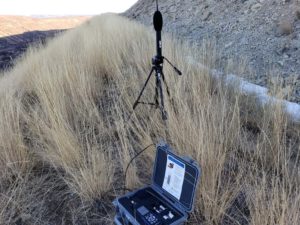New Regulations in Colorado Require Noise Monitoring at Well Sites
Summit’s experience can equip you to meet the requirements
Our friends in the Oil and Gas industry are facing new requirements to monitor and possibly mitigate the sound levels associated with their operations. The requirements are part of the 2020 updates to Colorado’s permitting process. The regulations related to noise monitoring are in Section 400 of COGCC rules. Learn More
It is important to note that noise monitoring has been required in the past as part of an operator’s 2A form, also known as the Oil and Gas Location Assessment form. Most often the noise monitoring was required by the BLM as a tool to assess noise level and their impacts on wildlife.
Although the COGCC Section 400 rules are new and we don’t have enough history to predict their use or enforcement, it can safely be assumed that any operations with potential to create a noise nuisance at nearby dwellings should at a minimum evaluate the potential to develop a Noise Mitigation plan, and most likely put a plan and some level of monitoring in place.
Summit’s experience in sound monitoring was developed as a service to Oil and Gas clients in western Colorado. These locations were complying with requirements to manage sound impacts on wildlife. Through this experience our team has learned how to quickly deploy a sound monitoring array and monitor over various time spans to document actual sound levels in real world conditions.
How does sound monitoring work?
Depending on the application we can set up one or several microphones, linked to a monitor unit that records sound levels over time. For the new regulations requiring sound monitoring near dwellings, sound data must be captured at various distances from the well pad and/or nearby dwellings.

The specifics of the locations and timing will be developed as part of your Mitigation Plan, but generally, you will want to capture data at least 350 feet from the well pad and no less than 25 feet from nearby dwellings.
How would we get started?
Summit can help right from the start. We will meet with your team to learn about your upcoming operations and schedules. From there we will write and submit the noise mitigation plan, which also outlines your proposed methods of gathering sound data.
After the noise mitigation plan is in place, we will coordinate the scheduling of our deployment. Our employees are prepared to meet your expectations for safety on site, and once the plan is in place we require no additional supervision. After the noise monitoring event, we will rapidly prepare our report and discuss the findings and possible next steps with you.
Summit has multiple Oil and Gas MSAs in place and we understand your safety needs and unique work environments. Let’s discuss your upcoming projects and make a plan to help you comply with these regulations so you can do what you do best. Don’t have time to set up an MSA? At your request, we are happy to subcontract to one of your existing vendors to speed up the process.
